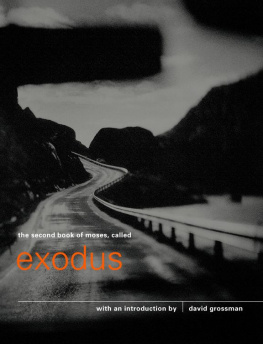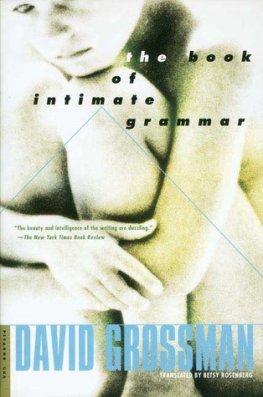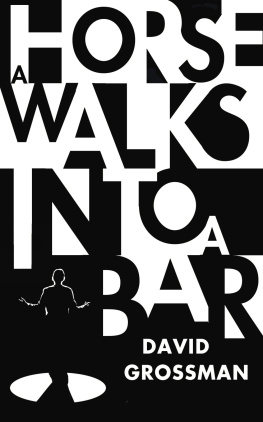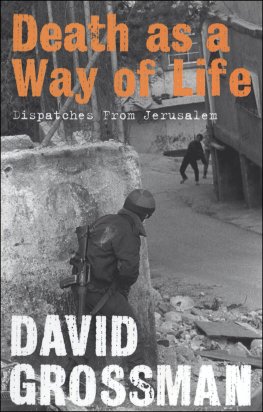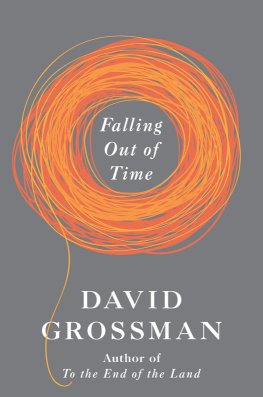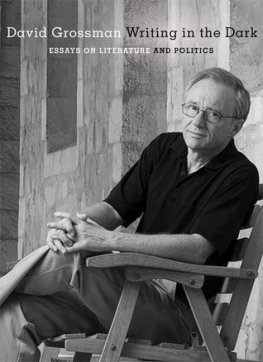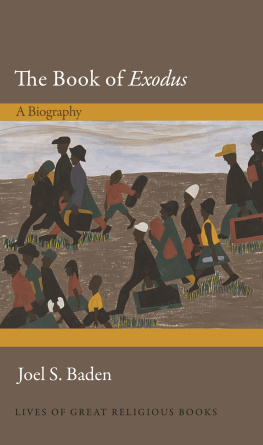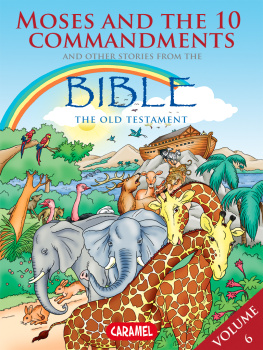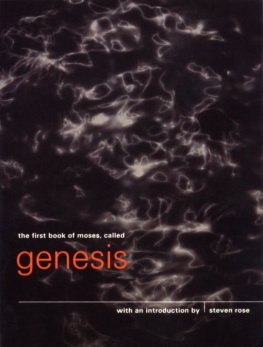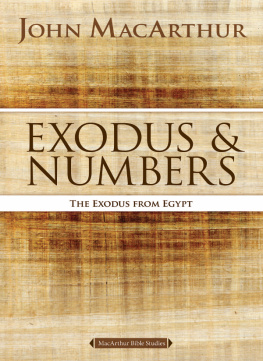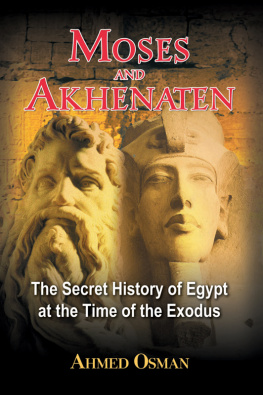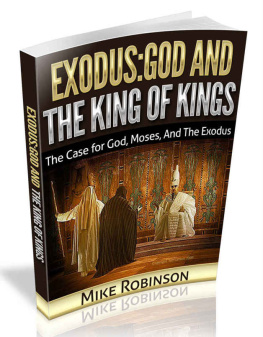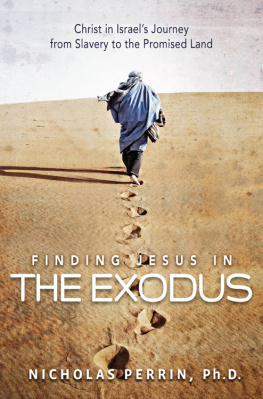David Grossman - The Second Book of Moses, Called Exodus
Here you can read online David Grossman - The Second Book of Moses, Called Exodus full text of the book (entire story) in english for free. Download pdf and epub, get meaning, cover and reviews about this ebook. year: 1999, publisher: Canongate Books, genre: Home and family. Description of the work, (preface) as well as reviews are available. Best literature library LitArk.com created for fans of good reading and offers a wide selection of genres:
Romance novel
Science fiction
Adventure
Detective
Science
History
Home and family
Prose
Art
Politics
Computer
Non-fiction
Religion
Business
Children
Humor
Choose a favorite category and find really read worthwhile books. Enjoy immersion in the world of imagination, feel the emotions of the characters or learn something new for yourself, make an fascinating discovery.
- Book:The Second Book of Moses, Called Exodus
- Author:
- Publisher:Canongate Books
- Genre:
- Year:1999
- Rating:5 / 5
- Favourites:Add to favourites
- Your mark:
- 100
- 1
- 2
- 3
- 4
- 5
The Second Book of Moses, Called Exodus: summary, description and annotation
We offer to read an annotation, description, summary or preface (depends on what the author of the book "The Second Book of Moses, Called Exodus" wrote himself). If you haven't found the necessary information about the book — write in the comments, we will try to find it.
A central theme running through the Bible, Exodus tells of the mass movement of people, including the Israelites escape from slavery, the wanderings of Moses and his followers and the Ten Commandments given to Moses on Mount Sinai. The text is introduced by author David Grossman.
The Second Book of Moses, Called Exodus — read online for free the complete book (whole text) full work
Below is the text of the book, divided by pages. System saving the place of the last page read, allows you to conveniently read the book "The Second Book of Moses, Called Exodus" online for free, without having to search again every time where you left off. Put a bookmark, and you can go to the page where you finished reading at any time.
Font size:
Interval:
Bookmark:
The Authorised King James Version of the Bible, translated between 160311, coincided with an extraordinary flowering of English literature. This version, more than any other, and possibly more than any other work in history, has had an influence in shaping the language we speak and write today. Presenting individual books from the Bible as separate volumes, as they were originally conceived, encourages the reader to approach them as literary works in their own right.
The first twelve books in this series encompass categories as diverse as history, fiction, philosophy, love poetry and law. Each Pocket Canon also has its own introduction, specially commissioned from an impressive range of writers, which provides a personal interpretation of the text and explores its contemporary relevance.
Into the swirl of events at the beginning The Book of Exodus the tale of the bondage and oppression of the children of Israel and the growing enmity between the Israelites and Egyptians seeps another, more personal and poignant story: a Hebrew child is born and his mother, who would save him from the death decreed for all sons by Pharaoh, lays him in a basket of bulrushes and sets the basket in the Nile. There, among the reeds, the daughter of the King of Egypt finds him. Pharaohs daughter knows instantly that he is one of the Hebrews children, but nevertheless decides to raise him as her son; she is the one who gives him his name, Moses.
How enchanting the entwining of this winsome tale with the tempestuous, epic myth of the birth of a nation. In a sense, this is the fabric of the entire book, an almost illusive weaving of fairy tale with strict legal and religious code: the warp rods that turn into serpents, a vicious, cruel king, a land blighted by a plague of frogs; the woof the giving of the law on Mount Sinai, the moment at which a people becomes welded to its destiny.
Reading The Book of Exodus is charged with tension: between the miserable, childlike state of the children of Israel, a people physically and spiritually enslaved, and the exalted role God has chosen for them, heedless of the pace of their spiritual and moral development. Perhaps this is the truly demanding journey made by the children of Israel in The Book of Exodus: from clan to nation, from slavery to freedom.
Here in my study in Jerusalem, in Israel, in the promised land to which the Jews have returned time and again from exile, I think about my forefathers, the children of Israel, during those first days after the maelstrom that uprooted them from Egypt. They are in the desert, and the desert is empty. They are being led, like an immense herd, to an unknown destination. What can they cling to? They escaped bondage in Egypt, but also abandoned their daily routine, their habits and customs, a familiar place and the social interactions and hierarchies that had become fixed over the course of generations. Suddenly everything is new and strange. Nothing can be taken for granted. What had appeared to be the end of the road, now appears to be its beginning. Somewhere in the heavens hovers the spirit of a God who seems to be benevolent; yet they, who have seen how He dealt with the Egyptians, know how unpredictable, brutal and fierce He can be.
Stunned, they stride onward, as if in a void. They follow their leader, a man who never lived among them, who from the time he was weaned lived in the kings palace and then in Midian. He tells them they are at long last free men, but perhaps free is the last thing they feel or want to be. Every day brings new experiences, new religious regulations and laws, and strange food enough for one day that falls from the skies.
If they have any spirit left they will realize that a miracle has befallen them, that they are privileged to have been given the chance to reinvent themselves, to be redeemed. If they dare, they can fashion a new identity for themselves. But to do so they must fight the ponderous gravity of habit, of anxiety and doubt, of inner bondage.
Maybe their hearts swelled at times the expansive, dramatic landscapes of Sinai could have awakened unfamiliar feelings in the hearts of those who had for generations lived the choked lives of slaves in the confines of huts. Suddenly the body could try broader, more daring movements. Perhaps an ancient memory, thousands of years old, flickered, of their forefathers wending their way toward Egypt across this very desert on a journey of which only shards of legend remain. Perhaps their carrying the body of Joseph, son of Jacob, to burial in the land of Israel made tangible for them the abstract promise of return to their country; return to the place where Joseph was a child, and Jacob before him lived; return home.
In addition, a new factor entered their lives: calendar time. God determined the cycle of their days, sealing the week with the Sabbath (Exodus 16:23). Since the six days of creation this concept of the week had hovered over the Torah, yet only now does it become clear to the reader that this concept was apparently known to God alone. Now He imparts it to His people. Can we, who were born within calendar time, fathom the impact this conceptual change must have had on human beings? Did it strengthen their sense of the circular, the cyclical, the monotonous? Or did time suddenly seem to be just another dimension of the desert in which they were trapped?
Not only did God create the circle of the week, but He designated holidays and festivals, setting the new year at Passover to emphasize its historic, religious and national significance. What did the children of Israel feel about Gods having inscribed them in the historical consciousness of generations to come, while they themselves were but the dust of men, bewildered and frightened? Did they know they were only one step on the road to another, more exalted existence? At the end of a long days wandering, as they sat by a dying fire, did a bitter, tragic silence fall as they realized, vaguely, that they were but putty in Gods hands, their tortured existence destined to become a history and a religion, an epic tale, and their ability to comprehend this tale no more than that of letters to comprehend a book?
In The Book of Numbers (14:18 ff), God decrees that the entire generation of those who fled Egypt a defiant generation that consistently refused to believe in God wholeheartedly and with complete faith will be destroyed in the during the sojourn in the desert, the children of Israel would dig themselves graves and lie in them, rising in the morning to see who had remained alive.
Even today, the Jewish people read in the Passover Haggadah that in every generation, each individual is bound to regard himself as if he personally had gone forth from Egypt. This is a direct summons to the people of Israel to examine the essential components of their identity.
It is difficult to grasp just how crucial those forty years in the desert were to the formation of the Jewish people as a people. During those years, the lines of its national character were drawn through the crucible of slavery and victimhood and the ensuing phenomenal propensity for redemption and rejuvenation. Moreover, a complex pattern of contradictory emotions was formed: pride, indeed arrogance, over being the chosen people, tempered by a sense of having been banished, even cursed the price of such mysterious chosenness; comfort and security in the knowledge of being the people of Yahweh, tempered by a fear of that same invisible and fickle God, Himself seemingly buffeted by internal storms rife with contradiction; and a taste for wandering, branded on the consciousness during the wandering in the desert, tempered by an intense longing for a promised land where and only where existence could at last be merged with identity, and a zest for living could be freed. Wandering is also searching, and longing always gives rise to new ideas and abstract thought. Gradually, searching and longing affect the dormant consciousness of this people that for generations had been subjugated, tethered to physical distress and hardship, become ossified. Searching and longing leave a unique mark on this people, reflected in its ideological motivation, its penchant for the abstract and talent at keeping an entire reality alive in its imagination, its aspirations and yearnings and, above all, its ability to be revitalized by the power of a dream, to use a dream to rise above real affliction.
Font size:
Interval:
Bookmark:
Similar books «The Second Book of Moses, Called Exodus»
Look at similar books to The Second Book of Moses, Called Exodus. We have selected literature similar in name and meaning in the hope of providing readers with more options to find new, interesting, not yet read works.
Discussion, reviews of the book The Second Book of Moses, Called Exodus and just readers' own opinions. Leave your comments, write what you think about the work, its meaning or the main characters. Specify what exactly you liked and what you didn't like, and why you think so.

